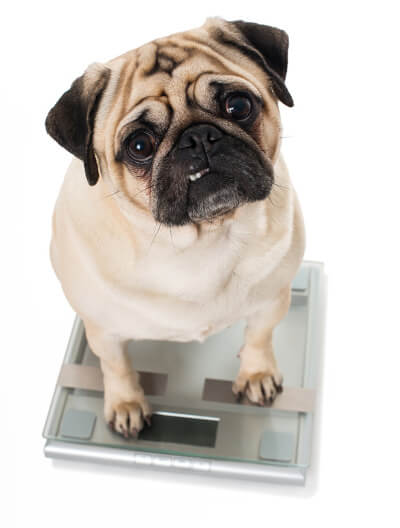FYI: If you buy something through a link on this site I may earn a commission - at NO extra cost to you.
Understanding Puppy Weight Estimates
Puppy weight estimates are not an exact science! They're simply a way to 'guess-timate' how big your little Fido may be as an adult.
Although no one can give you any guarantees about how tall your pup will be as an adult, or how much he will weigh, there are often some clues.
If you've brought home a purebred puppy then you've got a general idea of the breed's adult size. After all a tiny baby Yorkie isn't going to end up the size of the neighbors Labrador Retriever.
But if Fido is a mixed breed puppy, then the element of 'surprise!' is going to be much greater.

Every single puppy is unique, and within the same breed (even within the same litter) there can be a noticeable difference in size between siblings. Don't assume the pup who is the smallest at 6 or 8 weeks, is going to be the smallest as an adult.
The size of a very young puppy is not an accurate indicator of adult height/weight and although genetics play the biggest role in determining the adult size of any pup, health and diet also come into play.
Although the tips on this page (and the graphs on my Puppy Weight Chart page) can help you get a rough idea of how big your puppy may be as an adult, there are no guarantees.
Gender plays a part in a puppy's adult size. Female dogs are usually smaller than males, both in terms of height and weight, but of course there are exceptions. This size difference is often more pronounced in large and giant breeds, but can be seen across the board.
Even purebred puppies from the same litter grow and develop at different rates. Use the info. on these pages as guidelines but don't expect your pup to meet the numbers, or line graph, exactly. There is no such thing as the 'average' puppy!
Spaying or neutering your puppy can also affect growth and early altering may slow down, or reduce, muscle development and decrease appetite. Again, this is more likely in large or giant breeds, and delaying the spay/neuter until 9 months, or even later, may avoid this possibility.
How Breed Affects Puppy Growth
Dogs come in a wider variety of sizes and appearances than any other species on our planet.
This huge difference in size means that there is no 'one-size-fits-all' calculation for estimating a puppy's adult weight.
The most rapid puppy growth & development takes place between birth and 6 months of age, but they continue to put on weight and gain height until they reach adult size.
The most rapid growth will gradually slow down once your pup reaches approx. 65% of his adult height.
Tiny and toy breeds develop at a faster rate and reach maturity much earlier than the large or giant breeds.
Puppies grow fastest during this period:
- Teacup and Toy breeds - Birth to 11 weeks
- Small and Medium breeds - Birth to 16 weeks
- Large and Giant breeds - Birth to 5 months
Studies in the UK indicate that you can expect a small or medium breed puppy to reach 99% of it's adult weight somewhere between 9 and 10 months of age.
Large or giant breed puppies take longer to mature, and don't reach this stage until they're at least 12 - 18 months old.
Puppies from breeds at the top end of this scale (are unlikely to really be 'finished growing' until they're 2 (or even 3) years old.

A pup reaches his full height before he reaches his full weight. At 4 months old most dogs will only have reached about 30% of their adult weight, but 60% of their adult height.
This variation puts their bodies 'out of whack' and is largely responsible for what I call the 'puppy uglies'... which is especially noticeable in large and giant breed pups.
I had one big-boy Rottweiler who looked like a 'bobble-head' for pretty much the whole of his second year of life! He had a huge frame, massive head, and was on the top end of the height scale for a Rottie, but he was fairly 'slender'.... hence the bobble-head effect.
This pup actually didn't 'grow into' his bone structure until he was two and a half years old and eventually weighed around 135lbs - a big, muscular lapdog.
Puppy Weight Estimates - Doing The Math
There are lots of different methods of calculating puppy weight estimates, none of them can predict exactly how much little Fido is going to weigh when he's all grown up but they can give you a ballpark figure.

- On average, a puppy should double his birth weight by one week old. Followed by a consistent 5% - 10% daily increase.
- From six weeks onward, a small breed pup may gain around 5oz per week, a large breed pup around 2.5lbs
- You can get puppy weight estimates for tiny and toy breeds when adult, by doubling the weight of your pup at 6 weeks, and then doubling it again.
-
For a medium to large breed puppy you can get an idea of their adult
weight by doubling his weight at 14 weeks and then adding another half
of his 14 week figure.
- At 6 months old, your medium-to-large-breed puppy may reach approx. two-thirds of his adult weight. Giant breeds are likely to be approx. half of their adult weight at this age.
- For a giant breed puppy, you can double his weight at 6 months to get a rough idea of how much he may weigh as an adult.
If you're the proud owner of a mixed-breed dog (or one who you were told was purebred, but are having doubts about), there are some simple dog dna testing kits that you can buy online and use at home. All you need to do is send off the sample (a simple cheek-swab with a Q-tip!) to the laboratory and wait for 2 - 3 weeks for the results.

You'll get info. on the dominant breeds in your dogs genetic make up and there are specific tests for mixed breeds, pure bred dogs and first-generation designer dogs (aka hybrids).
Although not guaranteed to be 100% accurate, these tests are a better way of determining your pup's eventual size, than relying entirely on the guesswork involved in puppy weight estimates. It can also give you valuable information on possible hereditary health conditions, dietary and exercise needs, breed-specific traits and instincts and much more.
How Diet Affects Your Puppy's Growth
It's very important to understand the relationship between proper nutrition and your puppy's growth.

Puppy weight estimates are based on a pup being well fed.
Obviously underfeeding will have a negative effect on your puppys' health and development, preventing him from reaching his full potential in terms of size/growth.
Many dog owners don't realize just how many problems overfeeding can cause. Obesity in dogs is on the rise, and this is usually a direct result of feeding a dog too much in general or too much of the wrong food.
Being overweight puts your dog at risk of all sorts of health problems and overfeeding can also cause serious developmental issues particularly in large to giant breed pups.
Young puppies are usually chubby and a bit round, as they grow this changes and adolescent puppies swing the other way... often looking 'leggy' and a bit out of proportion. Both of these situations are totally normal and it's important not to reduce or increase the amount you feed based on these factors alone.
Your veterinarian is the best person to put your mind at rest in terms of whether or not little Fido is a healthy weight.
At regular vet visits his weight will be recorded, and if there are any concerns you will hear about them. However, if at any other time you're concerned, take him for a weigh-in and talk to your vet.
Lifelong musculoskeletal (muscle, bone and
joint) problems can be caused by overfeeding your large breed puppy, by
feeding him the wrong type of food, or by adding unnecessary
supplements.
The growth of a large breed puppy needs to be carefully controlled, and it's vital that you feed a puppy food that has been specifically formulated for large breed pups.
Lower levels of calcium, protein and calories are believed to help prevent 'too rapid' growth of his bones, and avoid the development of bone and joint disease.
Small
breed puppies don't usually suffer from musculo-skeletal conditions the
way large breed pups do, but they do have their own very individual
needs when it comes to nutrition.
Tiny breeds have a fast metabolic rate and tiny tummies, and need a puppy food that contains higher levels of protein and fat, and to be fed more often. Hypoglycemia (sudden, severe drop in blood sugar) can also occur in tiny breeds if they're not fed properly.
You can learn how to calculate the amount of food your puppy needs each day HERE
Sometimes owners can be impatient with the slow puppy growth rate of their large or giant breed pup, and want to 'speed up' his weight gain. They just can't wait to get their pup to the 'big and brawny' stage!
But beware, this is absolutely the wrong thing to do and overfeeding may actually cause a puppy to never reach his full potential. Remember, patience is a virtue!
For more help understanding puppy weight estimates, take a look at the puppy growth chart for small/toy or large/giant breed puppies on my Puppy Weight Chart page.
you might also like...
- Home
- Puppy Care 101
- Puppy Weight Estimates
FTC Disclosure: Some pages on this site contain affiliate links. I may earn on qualified purchases.





